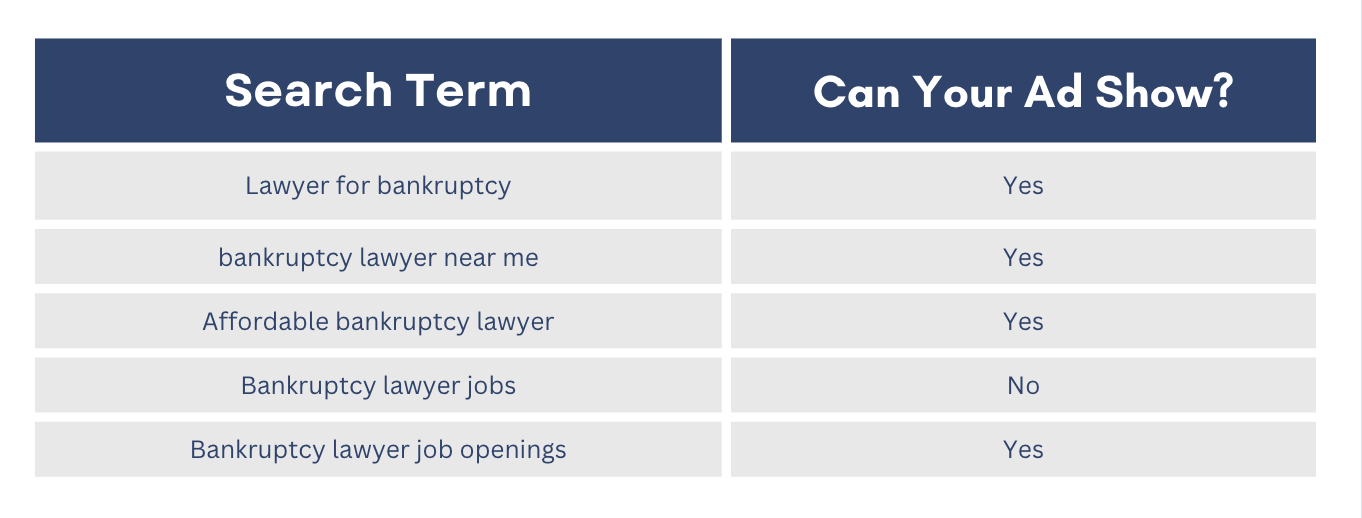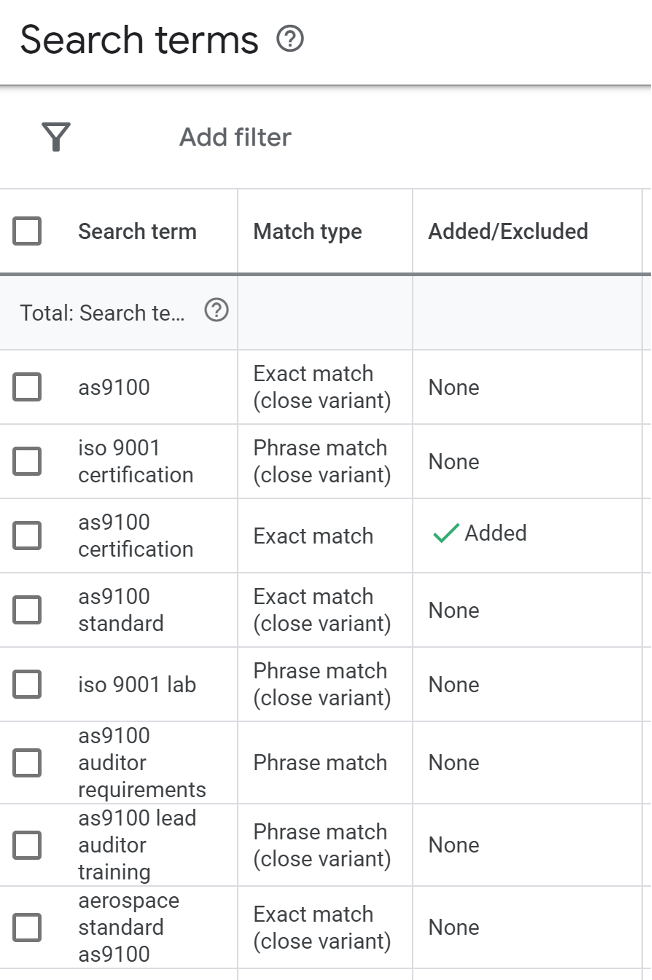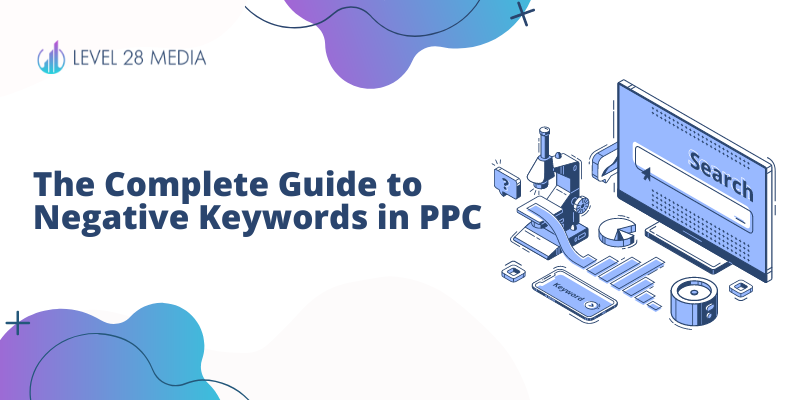While many businesses focus on keywords they want to target within their Google Ads campaigns, it’s equally important to think about what keywords you don’t want your ads to appear for. These are called negative keywords.
Having a running list of negative keywords is key to helping you save money, increase your click-through rates, and best of all improve leads and lead quality!
In this blog, you will learn what negative keywords are and how you can use them to improve your Google Ads campaign performance.
What Are Negative Keywords?
Negative keywords are keywords that you can exclude from your Google Ads campaign. These are terms that you don’t want your ads to appear for. For example, if you are a commercial roofer serving only businesses, then you’d want to exclude terms like “residential roofing” because you don’t want to attract prospects you cannot service.
Without negative keywords on your campaign, this could result in more irrelevant clicks that you have to pay for which will ultimately drain your budget!
Similar to how you select your targeted keywords, negative keywords can either be broad, phrase, or exact match. Additionally, negative keywords can be applied at the account level, campaign level, or ad group level.
Importance of Using Negative Keywords in a PPC Campaign
Implementing a negative keyword list can help your campaigns generate a higher click-through rate (CTR) and better quality leads. The more targeted your ads are, the higher chance that someone will click through to convert into a qualified lead.
In addition, more clicks and impressions from the wrong searchers can cost you a lot of money! If you are in an industry that has a high cost per click (for example: legal or healthcare), useless clicks will drain your budget quickly. You don’t want a poor ROI, right?
With greater control over your campaign’s visibility to targeted searchers, you can increase conversion rates and get a better return on your ad budget investment!
What Are the Different Types of Negative Keywords?
Negative broad match – If you use negative broad match, then your ad will not show for any of the terms that are in the search term. This includes the words being in a completely different order. However, if a search term contains some of the terms in your negative keyword, then it can still possibly show.
For example, let’s look at scenarios if you were to use jobs as a negative broad match term for your bankruptcy lawyer ad campaign.

Negative phrase match – This is a case where your ad won’t show if the search contains the exact keyword terms in the specified order. If there are extra words around the term, your ad can still show. In this example, let’s assume you use the term family lawyer as a negative phrase match keyword.

Negative exact match – You would use this type of negative keyword if you do not want your ad to show for the exact keyword terms, in the specified order, and without extra words. This is the most strict and specific way to use a negative keyword.
This is a good way to eliminate clicks and impressions for people who aren’t ready to buy or conducting general research. However, you have to be careful as you can potentially eliminate too many searches.
Let’s take a look if your negative exact match keyword is bankruptcy lawyer

How to Build a Negative Keyword List
As mentioned before, building the right negative keyword list can save you money and improve your campaign performance. However, going overboard with your selection can reduce your ad reach! This means fewer eyeballs on your ads. This is fine as long as your goal is not just reach but leads. You want to get the most targeted searches as possible!
Think Carefully About Your Terms
You don’t want to wait for your ad to appear for irrelevant terms and then have to add those keywords to your negative keyword list. Ideally, you’ll want to be proactive in building the list.
Start by thinking about the search terms that you do not want your ads to show up for. For example, if you are a high-end architecture firm then you will want to add keywords such as cheap and affordable to your negative keyword list. You do not want to be serving search ads to people who do not represent your ideal customer profile.
You also want to think about whether these terms should be account level or campaign level. Adding cheap and affordable architecture firm to an account level will make sense for you if you never want to appear for those terms across your account. If you specialize in different styles of architecture, then it will make more sense to add those styles on a campaign level so your ads are not competing against each other.
Look At What People Are Searching for to Find Your Ads
As part of your campaign upkeep and optimization process, you should be actively looking at the search terms that people are using to find your ads on a regular basis. You can check this by going to Keywords and then clicking on Search Terms.

If you see a term associated with high CTR, low conversion rates, and the term is irrelevant, it’s time to add the keyword to your negative keyword list!
For example, this could be a person searching for government-sponsored in-home care services and your ad shows up. If your in-home care business does not take insurance and is cash-based, then you are spending money on irrelevant clicks.
Negative keyword selection doesn’t have to be intimidating if you understand your business goals and have a clearly defined ideal customer profile. This will drive your negative keyword strategy along with your entire PPC strategy.
Closing Thoughts
Negative keywords are often an afterthought, but they should never be. Remember, the point of PPC is to put your company in front of the right searchers at the right time.
The process may be time-consuming at first, but having a negative keyword list will yield better results for your PPC campaign
Your hard-earned PPC budget should be spent on more relevant clicks and searches – after all, your goal is to generate more leads, right?

Michelle Kop is a marketing consultant and award-winning pay-per-click marketing strategist. She has over 8 years of professional paid advertising experience in Google and Microsoft Ads, with a specialization in lead generation for B2B and B2C companies.
After working in corporate marketing with Fortune Global 500 Brands like Toyota and BP, Michelle founded Level 28 Media, a lead generation micro-agency for small to medium businesses.


